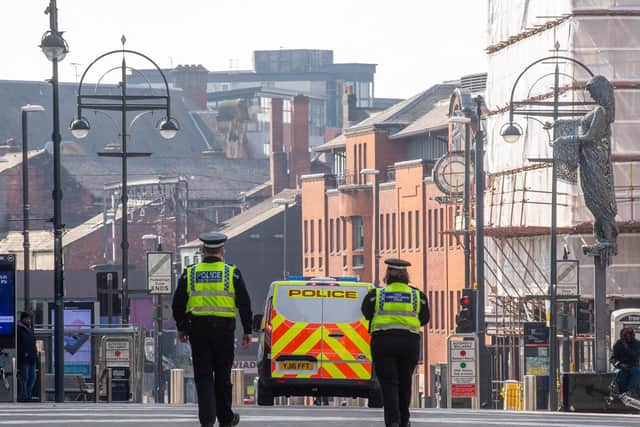Leeds Tier 3 lockdown: These are the fines for breaking Very High Covid restrictions in full
and live on Freeview channel 276
The new Tier 3 measures mean that pubs, bars, casinos and adult gaming centres must be immediately shut - on top of all the Tier 2 rules remaining in place.
All casinos, soft play areas, adult gaming centres, betting shops and car boot sales must close and only restaurants and pubs serving 'predominantly food' can remain open.
Advertisement
Hide AdAdvertisement
Hide AdHousehold mixing remains banned and mixing in private gardens is now also banned.


That means that the fines for breaking Covid laws will now apply in Leeds' Tier 3 status - and police can take action if you break the rules.
What the law says - and what the fines are:
You must not meet socially with friends and family indoors in any setting unless they are part of your household or support bubble.
This includes private homes and indoors in hospitality venues, such as pubs.
Advertisement
Hide AdAdvertisement
Hide AdYou must also not meet with people outside of your household or support bubble in a private garden or in most outdoor public venues - except for parks, beaches, countryside, forests, public gardens and outdoor sports facilities.
The police can take action against you if you break these rules. This includes breaking up illegal gatherings and issuing fines (fixed penalty notices).
You can be fined £200 for the first offence, doubling for further offences up to a maximum of £6,400.
If you hold, or are involved in holding, an illegal gathering of over 30 people, the police can issue fines of £10,000.
Advertisement
Hide AdAdvertisement
Hide AdIf you live in Tier 3 level area you also cannot meet indoors with people outside of the area, unless exceptions apply.
What are the Covid law exceptions?
There are exceptions where people from different households can gather beyond the limits set out above. These exceptions are:
in a legally permitted support bubble
in a legally permitted childcare bubble (see section on childcare below for more details)
for work, volunteering to provide voluntary or charitable services (see guidance on working safely in other people’s homes)
for registered childcare, education or training
Advertisement
Hide AdAdvertisement
Hide Adfor arrangements where children do not live in the same household as both their parents or guardians
for prospective adopting parents to meet a child or children who may be placed with them
for supervised activities provided for children, including wraparound care (before and after school childcare), youth groups and activities, and children’s playgroups
for birth partners
to see someone who is dying
to provide emergency assistance, and to avoid injury or illness, or to escape a risk of harm
Advertisement
Hide AdAdvertisement
Hide Adto fulfil a legal obligation, such as attending court or jury service
to provide care or assistance to someone vulnerable
to facilitate a house move
for a wedding or equivalent ceremony and wedding receptions where the organiser has carried out a risk assessment and taken all reasonable measures to limit the risk of transmission of the virus – up to a maximum of 15 people (not to take place in private dwellings)
for funerals – up to a maximum of 30 people. Wakes and other commemorative events are permitted with up to 15 people present (not to take place in private dwellings)
for elite sportspeople and their coaches if necessary for competition and training, as well as parents or guardians if they are a child
Advertisement
Hide AdAdvertisement
Hide Adfor outdoor exercise and dance classes, organised outdoor sport, and licensed outdoor physical activity
indoor organised team sports for disabled people, and youth sport
support groups of up to 15 participants – formally organised groups to provide mutual aid, therapy or any other form of support (not to take place in private dwellings)
protests – if organised in compliance with COVID-secure guidance